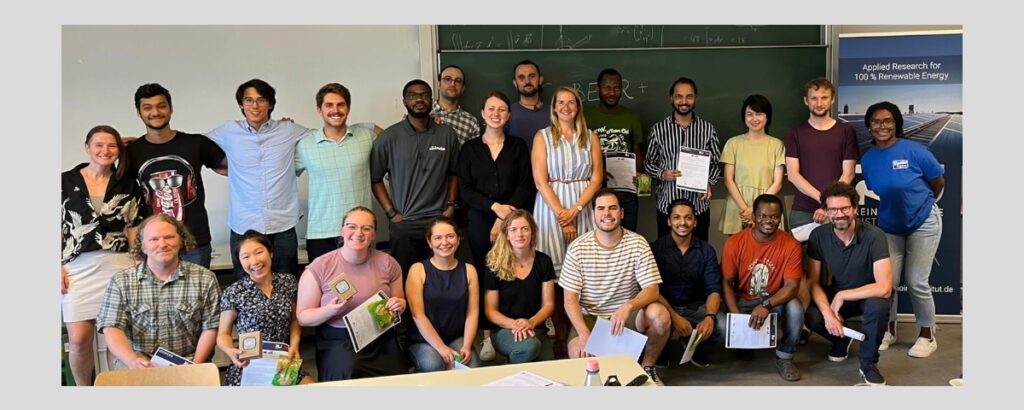Look back at the C-BEAR+ Summer School 2022
30th August 2022 | 16 participants, six workshops and a lot of cultural exchange: For the second time, young scientists and students had the opportunity to further educate theirselves for two weeks on different approaches around the transformation of energy systems within the framework of the California-Berlin Research and Exchange Plus (C-BEAR+) program at the RLI.
After a successful summer school 2019 and two years of Corona break, there was again a summer school at the RLI this year, supported by the Technical University of Berlin. The topic this time: “transformation of energy systems on islands and in a development context”. There were 16 participants from Nepal, Colombia, India, Nigeria and the USA from the US universities UC Berkeley, Arizona State University (ASU), Kentucky, UC San Diego, Alaska Fairbanks University and various German universities and institutions. For two weeks, the international group of young scientists and students worked intensively on issues in the context of electrification and energy supply on islands in interdisciplinary workshops.
The topics of the workshops were:
o Workshop I: Modeling and design of Renewable Energy systems
o Workshop II: Energy demand and willingness to pay – Household surveys in developing countries
o Workshop III: Geoinformation system (GIS) tools in the electrification context
o Workshop IV: Energy security on islands – climate change impact and resilience
o Workshop V: Sector coupling- Energy and Mobility on islands
o Workshop VI: Electricity access in informal settlements
Following the workshops in the first week, the summer school participants worked in groups of four on presentations on topics from the workshops. A jury consisting of RLI Managing Director Kathrin Goldammer and Philipp Blechinger, Head of the RLI Research Unit Off-Grid Systems, as well as Eva Ayaragarnchanakul and Peter Berrill from the Technical University of Berlin, awarded prizes to the best presentation of the teams: The winners were the members of Workshop IV, who specified the topic “climate resilient energy systems on Fiji island”. As a prize there was fame, honor and a solar flashlight for them.
In addition to the content work, the participants of the summer school visited the energy self-sufficient village Feldheim in Brandenburg, the think tank Agora Energiewende and the EUREF Campus in Berlin.
A cultural program with a street art tour through Berlin Friedrichshain and Kreuzberg, exciting discussions about the American and German electoral system in the Berlin Reichstag building, and a visit to the Berlin Unterwelten provided impetus for cultural exchange.
The California-Berlin Research and Exchange Plus (C-BEAR+) program, within which the summer school took place, is funded by the German Federal Ministry for Economic Affairs and Climate Action. The goal of the program is to establish research collaborations between Germany and research institutions in the U.S. to contribute to Sustainable Development Goal 7 (SDG7), universal access to sustainable energy.
As part of the CBEAR+ program, which will run until the end of 2023, there will be a conference next year. This will be held in collaboration with the RLS graduate school.
The summer school and the CBEAR+ program at the RLI are organized and led by RLI-researcher Clara Jütte.
